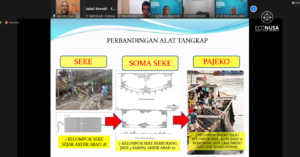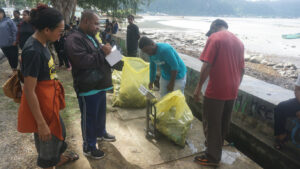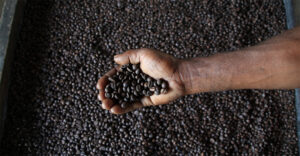
We had breakfast with steamed sweet potato with meshed garlic and chilly with tomato sauce prepared by Beyum Antonela Baru at her stilts house as her kitchen. We had warm tea breakfast in front of Mama Agustina Tahoba’s house while staring at falling down mist on the jungles in Seya Village, Mare District, Maybrat Regency, West Papua.
EcoNusa team has visited twice in the remote hamlet here to provide backup to indigenous people empowerment. Mare District is actually hard to reach. Only two-wheeled drives vehicle could pass to the village. The road access remains poor, let alone during rain. If it is careless, a vehicle could be trapped in the mud.
But above all, Seya Village has more advantages than Suswa, the capital of Mare District, or even Kumurkek, the capital of Maybrat Regency. The 4G signal in Seya and Rufases is far stronger than that of in those spots. The hardship of infrastructure access seems to be compensated by the easy virtual access.
Mare keeps progressing. The community has so far counted on the works form Village Fund from infrastructure development. The locals’ daily activities are gardening and seeking agarwood in the forest.
Read also: Plant Seeds for Rufases and Seya Villages
Beyum has been more than 18 months being a volunteer teaching for the early childhood education (PAUD) in Mare. It is saddening to note the education in this place. An elementary school only has three civil servant teachers and temporary teacher. Initially, PAUD operation ran by Village Fund program in 2019. Unfortunately, the allocation of Village Fund for PAUD was halted in 2020.
“The volunteer teachers are not paid, but they keep providing assistance to the PAUD students,” said Beyum.
For the reason, Beyum and some volunteers had initiative to build a village creative economy. By having innovation, Beyum said that there is potential in Mare to be developed. When creative economy runs well, it will help ease local women to survive and continue teaching young generations.

Formerly, the community has tried to improve economy by maximizing their crops. They plant pepper, red bean, spinach, tomato and mustard greens. The yield is satisfying. However, transportation remains the problem when they should sell the harvest. It is no wonder when every so often their crop is in vain.
“We should throw away the crop due to excessive yields at the garden. We have no idea of where to sell. It cost huge amount of money to car access,” said Wilhemus Bame, the head of Seya Village. In addition to transportation issue, their business challenge deals with improper process of crop.

Baca juga: Crab, Promising Potensial in South Sorong
The EcoNusa Covid-19 Response team assisted by Beyum observed some farming lands of the community. The wooden fences stretched along like barricade surrounding the garden. The fences were built to defend the crop from wild boar and deer.
One of the farming plots visited belongs to Mama Orpa Nauw. Mama Orpa showed fragrant lemongrass she just planted. As to Beyum, the fragrant lemongrass is their major focus which is expected to be their valuable commodity. The lemongrass will be processed into an essential oil. It important now to promote that commodity. With the existing internet access, Beyum has confident that fragrant lemongrass will be a prominent commodity from Mare District.
The creative economy development in Mare with lemongrass will come to real. However, it requires participation and supports from relevant authorities to build market access and better transportation infrastructure.
Editor: V. Arnila Wulandani & Leo Wahyudi




